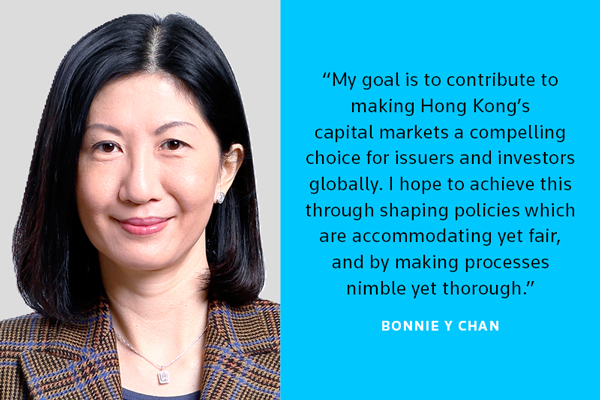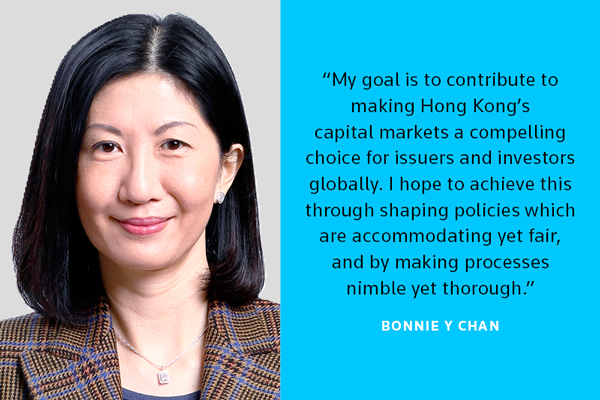
Seasoned capital markets expert Bonnie Y Chan recently rejoined Hong Kong Exchanges and Clearing (HKEX), the parent company of the Hong Kong stock exchange, as head of listing. Chan, who spent nearly a decade at Davis Polk & Wardwell, says that while she might have returned at a difficult time, her team is firmly focused on the future.
ALB: Before your role with Davis Polk, you held a senior role at HKEX. What brought you back?
CHAN: I had an immensely fulfilling time when I served as head of the IPO Department at HKEX from 2007-2010. During my nine years with Davis Polk as a private practitioner, I witnessed how Hong Kong’s markets underwent several significant changes as a result of policy initiatives championed by HKEX. I consider myself a clear beneficiary of those policy initiatives, many of which became the bedrock of my practice at Davis Polk. Now that I have passed the baton on to the younger partners at the firm, I feel that it is the right moment to return to HKEX and hopefully contribute to the shaping of policies that are fundamental to solidify Hong Kong’s position as an international financial centre.
ALB: 2020 has been an incredibly tough year so far. What have been the big challenges and adjustments for the team?
CHAN: Indeed, everyone has had to adjust to the constraints of working from home while coming up with solutions to unprecedented challenges. However, I am very grateful and proud to be leading a team that is aware that their jobs have an important and unique purpose, which is to maintain the smooth functioning of Hong Kong’s markets. In just three months, we have already issued special guidance to the market four times, providing relief and advice to the market in light of COVID-19. HKEX as a whole has risen to the challenge to keep markets open and stable while collaborating with all of our stakeholders and the communities in which we operate to do what we can to help others get through these difficult times.
ALB: What are your key focuses for HKEX over the coming months?
CHAN: I can see a number of key focuses on the regulatory front. Many listed issuers will have to take stock of the impact of COVID-19, and inevitably a number of them may have to respond with more exceptional measures. We will endeavour to help these listed issuers navigate through these challenges while bearing in mind the interests of investors and the need to keep the market informed. Some listing applicants have had their IPO plans disrupted. However, I sense an eagerness to resume activities, and the Listing Division will do our best to facilitate reinstating the pipeline flow as soon as that is possible and appropriate.
ALB: What are some of the key listing trends we’re seeing emerge in Hong Kong at the moment?
CHAN: We introduced a very significant set of reforms two years ago with a number of new chapters added to the Listing Rules to enable new economy companies to list in Hong Kong. We have seen those reforms bear fruit and there is now a meaningful population of TMT and biotech issuers listed on HKEX. I believe this trend will continue, and we have received many enquiries from potential issuers and the enthusiasm in the market is remarkable. We will continue to refine the listing regime so that Hong Kong remains a leading IPO centre.
ALB: Looking longer term, what do you want to achieve during your time in the role?
CHAN: My goal is to contribute to making Hong Kong’s capital markets a compel-ling choice for issuers and investors globally. I hope to achieve this through shaping policies which are accommodating yet fair, and by making processes nimble yet thorough. I would also like to devote a good part of my time grooming the next generation of leaders for the Listing Division.
To contact the editorial team, please email ALBEditor@thomsonreuters.com.



